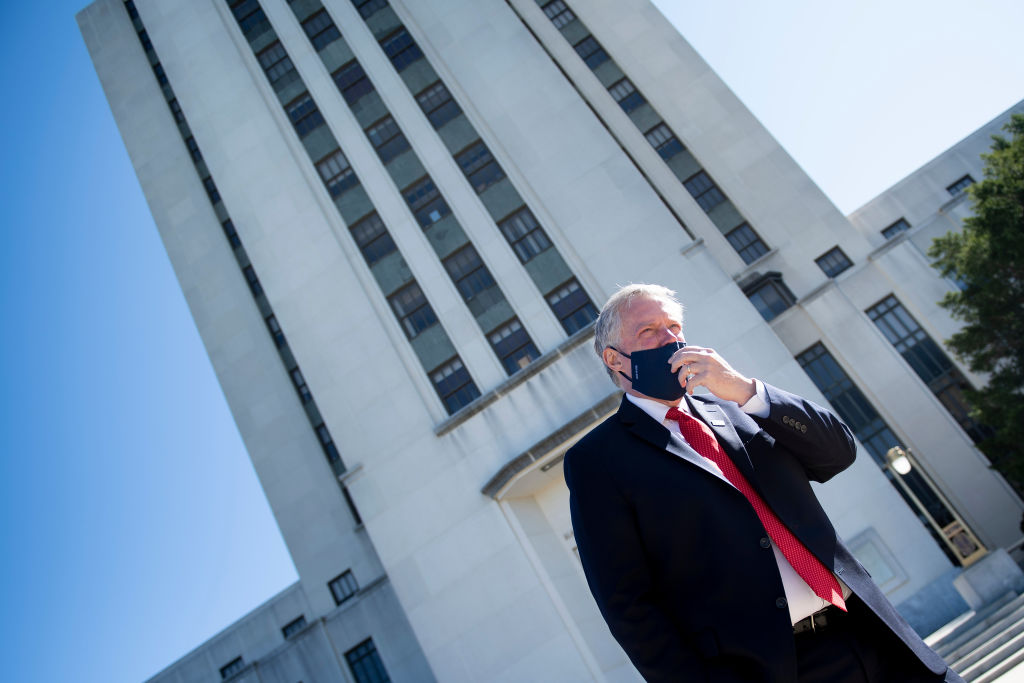Trump reportedly wasn't pleased Mark Meadows publicly expressed concern about his health


A free daily email with the biggest news stories of the day – and the best features from TheWeek.com
You are now subscribed
Your newsletter sign-up was successful
President Trump continued to sound optimistic about his COVID-19 treatment Saturday evening in a video message from his suite at Walter Reed hospital in Bethesda, Maryland. Trump acknowledged he wasn't "feeling so well" when he first arrived at the hospital Friday, but added that he felt better at the time of the video. While he is expecting "a very good result" from his treatment, Trump said "over the next few days we're probably going to know for sure."
Trump's comments were more or less in line with a Saturday evening report from his physician, Navy Commander Dr. Sean Conley, who said he's "extremely happy" with the president's progress, noting that Trump received his second dose of the antiviral drug remdesivir. Trump is "not yet out of the woods," but the medical team "remains cautiously optimistic," Conley said in a statement.
Messaging from the White House wasn't always clear throughout Saturday, however, and questions about Trump's health remain. White House Chief of Staff Mark Meadows, for instance, told reporters Trump's vitals were "very concerning" on Friday, prompting doctors to give him supplemental oxygen before he left the White House for Walter Reed. Per Reuters, an anonymous Trump adviser said the president wasn't pleased when he learned about Meadows' remarks.
The Week
Escape your echo chamber. Get the facts behind the news, plus analysis from multiple perspectives.

Sign up for The Week's Free Newsletters
From our morning news briefing to a weekly Good News Newsletter, get the best of The Week delivered directly to your inbox.
From our morning news briefing to a weekly Good News Newsletter, get the best of The Week delivered directly to your inbox.
Meadows later phoned in to Fox News on Saturday evening, and reiterated to host Jeanine Pirro that Trump's blood oxygen level dropped "rapidly" on Friday, but he also expressed a lot of optimism about the president's condition this time around. Tim O'Donnell
A free daily email with the biggest news stories of the day – and the best features from TheWeek.com
Tim is a staff writer at The Week and has contributed to Bedford and Bowery and The New York Transatlantic. He is a graduate of Occidental College and NYU's journalism school. Tim enjoys writing about baseball, Europe, and extinct megafauna. He lives in New York City.
-
 Health insurance: Premiums soar as ACA subsidies end
Health insurance: Premiums soar as ACA subsidies endFeature 1.4 million people have dropped coverage
-
 Anthropic: AI triggers the ‘SaaSpocalypse’
Anthropic: AI triggers the ‘SaaSpocalypse’Feature A grim reaper for software services?
-
 NIH director Bhattacharya tapped as acting CDC head
NIH director Bhattacharya tapped as acting CDC headSpeed Read Jay Bhattacharya, a critic of the CDC’s Covid-19 response, will now lead the Centers for Disease Control and Prevention
-
 Trump HHS slashes advised child vaccinations
Trump HHS slashes advised child vaccinationsSpeed Read In a widely condemned move, the CDC will now recommend that children get vaccinated against 11 communicable diseases, not 17
-
 FDA OKs generic abortion pill, riling the right
FDA OKs generic abortion pill, riling the rightSpeed Read The drug in question is a generic version of mifepristone, used to carry out two-thirds of US abortions
-
 RFK Jr. vaccine panel advises restricting MMRV shot
RFK Jr. vaccine panel advises restricting MMRV shotSpeed Read The committee voted to restrict access to a childhood vaccine against chickenpox
-
 Texas declares end to measles outbreak
Texas declares end to measles outbreakSpeed Read The vaccine-preventable disease is still spreading in neighboring states, Mexico and Canada
-
 RFK Jr. shuts down mRNA vaccine funding at agency
RFK Jr. shuts down mRNA vaccine funding at agencySpeed Read The decision canceled or modified 22 projects, primarily for work on vaccines and therapeutics for respiratory viruses
-
 Measles cases surge to 33-year high
Measles cases surge to 33-year highSpeed Read The infection was declared eliminated from the US in 2000 but has seen a resurgence amid vaccine hesitancy
-
 Kennedy's vaccine panel signals skepticism, change
Kennedy's vaccine panel signals skepticism, changeSpeed Read RFK Jr.'s new vaccine advisory board intends to make changes to the decades-old US immunization system
-
 Kennedy ousts entire CDC vaccine advisory panel
Kennedy ousts entire CDC vaccine advisory panelspeed read Health Secretary RFK Jr. is a longtime anti-vaccine activist who has criticized the panel of experts
